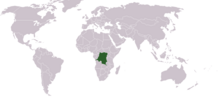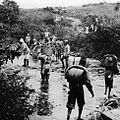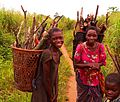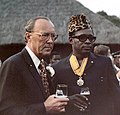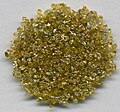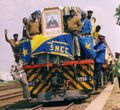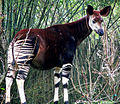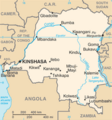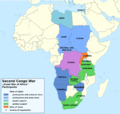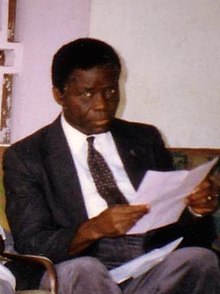Portal:Democratic Republic of the Congo
The Democratic Republic of the Congo Portal
The Democratic Republic of the Congo, also known as Congo-Kinshasa, Congo-Zaire, Congo DR, DR Congo, DRC, or simply either Congo or the Congo, is a country in Central Africa. By land area, the DRC is the second-largest country in Africa and the 11th-largest in the world. With a population of around 105 million, the Democratic Republic of the Congo is the most populous Francophone country in the world, and the fourth-largest in Africa. The national capital and largest city is Kinshasa, which is also the economic center. The country is bordered by the Republic of the Congo, Central African Republic, South Sudan, Uganda, Rwanda, Burundi, Tanzania (across Lake Tanganyika), Zambia, Angola, the Cabinda exclave of Angola, and the South Atlantic Ocean. Centered on the Congo Basin, the territory of the DRC was first inhabited by Central African foragers around 90,000 years ago and was reached by the Bantu expansion about 3,000 years ago. In the west, the Kingdom of Kongo ruled around the mouth of the Congo River from the 14th to 19th centuries. In the northeast, center, and east, the kingdoms of Azande, Luba, and Lunda ruled from the 16th and 17th centuries to the 19th century. King Leopold II of Belgium formally acquired rights to the Congo territory from the colonial nations of Europe in 1885 and declared the land his private property, naming it the Congo Free State. From 1885 to 1908, his colonial military forced the local population to produce rubber and committed widespread atrocities. In 1908, Leopold ceded the territory, which thus became a Belgian colony. Congo achieved independence from Belgium on 30 June 1960 and was immediately confronted by a series of secessionist movements, the assassination of Prime Minister Patrice Lumumba, and the seizure of power by Mobutu Sese Seko in a 1965 coup d'état. Mobutu renamed the country Zaire in 1971 and imposed a harsh personalist dictatorship until his overthrow in 1997 by the First Congo War. The country then had its name changed back and was confronted by the Second Congo War from 1998 to 2003, which resulted in the deaths of 5.4 million people. The war ended under President Joseph Kabila, who governed the country from 2001 to 2019 and under whom human rights in the country remained poor and included frequent abuses such as forced disappearances, torture, arbitrary imprisonment and restrictions on civil liberties. Following the 2018 general election, in the country's first peaceful transition of power since independence, Kabila was succeeded as president by Félix Tshisekedi, who has served as president since. Since 2015, the Eastern DR Congo has been the site of an ongoing military conflict in Kivu. The Democratic Republic of the Congo is extremely rich in natural resources but has suffered from political instability, a lack of infrastructure, corruption, and centuries of both commercial and colonial extraction and exploitation, followed by more than 60 years of independence, with little widespread development. Besides the capital Kinshasa, the two next largest cities, Lubumbashi and Mbuji-Mayi, are both mining communities. The DRC's largest export is raw minerals, with China accepting over 50% of its exports in 2019. In 2021, DR Congo's level of human development was ranked 179th out of 191 countries by the Human Development Index and is classed as a least developed country by the UN. , following two decades of various civil wars and continued internal conflicts, around 600,000 Congolese refugees were still living in neighbouring countries. Two million children risk starvation, and the fighting has displaced 4.5 million people. The country is a member of the United Nations, Non-Aligned Movement, African Union, COMESA, Southern African Development Community, Organisation Internationale de la Francophonie, and Economic Community of Central African States. (Full article...) Selected article - The Congo Free State, also known as the Independent State of the Congo (French: État indépendant du Congo), was a large state and absolute monarchy in Central Africa from 1885 to 1908. It was privately owned by King Leopold II, the constitutional monarch of the Kingdom of Belgium. In legal terms, the two separate nations were in a personal union. The Congo Free State was not a part of, nor did it belong to Belgium. Leopold was able to seize the region by convincing other European states at the Berlin Conference on Africa that he was involved in humanitarian and philanthropic work and would not tax trade. Via the International Association of the Congo, he was able to lay claim to most of the Congo Basin. On 29 May 1885, after the closure of the Berlin Conference, the king announced that he planned to name his possessions "the Congo Free State", an appellation which was not yet used at the Berlin Conference and which officially replaced "International Association of the Congo" on 1 August 1885. The Free State was privately controlled by Leopold from Brussels; he never visited it. The state included the entire area of the present Democratic Republic of the Congo and existed from 1885 to 1908, when the Belgian Federal Parliament reluctantly annexed the state as a colony belonging to Belgium after international pressure. (Full article...)General images -The following are images from various Democratic Republic of the Congo-related articles on Wikipedia.
This is a Good article, an article that meets a core set of high editorial standards.
From 1885 to 1908, many atrocities were committed in the Congo Free State (today the Democratic Republic of the Congo) under the absolute rule of King Leopold II of Belgium. These atrocities were particularly associated with the labour policies, enforced by colonial administrators, used to collect natural rubber for export. Combined with epidemic disease, famine, and falling birth rates caused by these disruptions, the atrocities contributed to a sharp decline in the Congolese population. The magnitude of the population fall over the period is disputed, with modern estimates ranging from 1.5 million to 13 million. At the Berlin Conference of 1884–1885, the European powers allocated most of the Congo Basin region to a supposedly philanthropic organisation run by Leopold II, who had long held ambitions for colonial expansion. The territory under Leopold's control exceeded 2,600,000 km2 (1,000,000 sq mi), more than 85 times the territory of Belgium; amid financial problems, it was directed by a tiny cadre of administrators drawn from across Europe. Initially the quasi-colony proved unprofitable and insufficient, with the state always close to bankruptcy. The boom in demand for natural rubber, which was abundant in the territory, created a radical shift in the 1890s—to facilitate the extraction and export of rubber, all vacant land in the Congo was nationalised, with the majority distributed to private companies as concessions. Some was kept by the state. Between 1891 and 1906, the companies were allowed free rein to exploit the concessions, with the result being that forced labour and violent coercion were used to collect the rubber cheaply and maximise profit. The Free State's military force, the Force Publique, enforced the labour policies. Individual workers who refused to participate in rubber collection could be killed and entire villages razed. (Full article...)
This is a Featured article, which represents some of the best content on English Wikipedia..
Marcel Antoine Lihau or Ebua Libana la Molengo Lihau (29 September 1931 – 9 April 1999) was a Congolese jurist, law professor and politician who served as the inaugural First President of the Supreme Court of Justice of the Congo from 1968 until 1975, and was involved in the creation of two constitutions for the Democratic Republic of the Congo. Lihau attended the Catholic University of Leuven in Belgium with the help of sympathetic Jesuit educators, becoming one of the first Congolese to study law. While there he encouraged Congolese politicians to form an alliance that allowed them to secure the independence of the Congo from Belgium. He served briefly as a justice official and negotiator for the Congolese central government before being appointed to lead a commission to draft a permanent national constitution. He was made dean of law faculty at Lovanium University in 1963. The following year he helped deliver the Luluabourg Constitution to the Congolese, which was adopted by referendum. (Full article...)
WikiProjectsTopicsCategoriesRelated portalsAssociated WikimediaThe following Wikimedia Foundation sister projects provide more on this subject:
Discover Wikipedia using portals | ||||||||



